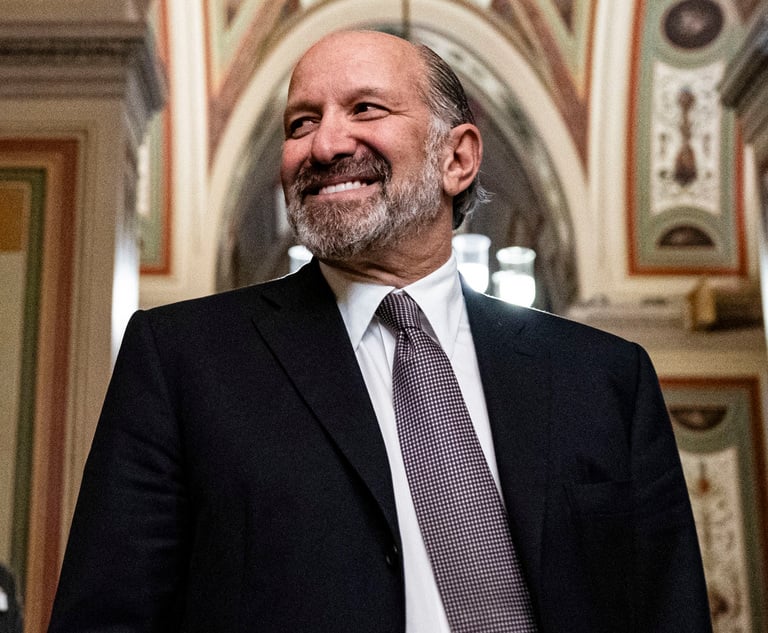 Illustration by Phil Wrigglesworth
Illustration by Phil WrigglesworthThe Birth of 'Permatemps'
Litigation over contingent workers can be traced back to a key case.
November 01, 2018 at 07:00 AM
2 minute read
In the late 1990s Microsoft Corp. ran afoul of the IRS when auditors discovered it had used thousands of “temporary” contract engineers who worked alongside regular employees for indefinite periods under similar conditions but didn't receive employee benefits. IRS auditors determined that the company supervised and controlled the engineers' work just like employees, and said they had to be treated as such for the purpose of withholding Social Security, Medicare and unemployment taxes. Microsoft admitted the error to the IRS, and was required to pay back taxes and overtime wages. Some employees were shifted to employee status.
After learning of the tax decision, however, some independent contractors also demanded to be included in the company's benefits plans, including its 401(k) and stock options plans. When Microsoft refused, they filed a suit in federal district court, which was dismissed. But upon appeal to the Ninth U.S. Circuit Court of Appeals, a three-judge panel decided in favor of the plaintiffs in Vizcaino v. Microsoft, 97 F3d 1187. The court en banc later reheard the case, and the 15-judge panel issued a decision in 1999 that mostly upheld the first appeal in Vizcaino v. Microsoft, 120 F.3d 1006.
The ruling and eventual $97 million settlement after years of litigation underscored the importance of companies distinguishing between contingent workers and employees; making sure that employee benefits plans specifically exclude contingent workers, and making certain that employment agreements with contingent workers have specific benefits waivers, according to employment law experts.
This content has been archived. It is available through our partners, LexisNexis® and Bloomberg Law.
To view this content, please continue to their sites.
Not a Lexis Subscriber?
Subscribe Now
Not a Bloomberg Law Subscriber?
Subscribe Now
NOT FOR REPRINT
© 2024 ALM Global, LLC, All Rights Reserved. Request academic re-use from www.copyright.com. All other uses, submit a request to [email protected]. For more information visit Asset & Logo Licensing.
You Might Like
View All
SEC Issues $6.75M Fine Against Financial Firm Led by Trump's Choice to Lead Commerce Dept.
3 minute read
Coinbase Hit With Antitrust Suit That Seeks to Change How Crypto Exchanges Operate
3 minute read
As Costs and Workloads Mount, Law Departments Turn to Tech and Workflow Overhauls
3 minute read
Auto Dealer Software Upstart Accuses Entrenched Competitor of 'Attempted Monopolization'
4 minute readTrending Stories
- 1Luigi Mangione's Attorney Gives a Master Class in How Not to Handle a High-Profile Case in the Media
- 2Trump, ABC News Settlement in Defamation Lawsuit Includes $1M in Attorney Fees For President-Elect
- 3Trump, ABC News Settle Defamation Lawsuit Before Depositions
- 4Call for Nominations: The Recorder and Law.com's California Legal Awards 2025
- 5The Week in Data Dec. 13: A Look at Legal Industry Trends by the Numbers
Who Got The Work
Michael G. Bongiorno, Andrew Scott Dulberg and Elizabeth E. Driscoll from Wilmer Cutler Pickering Hale and Dorr have stepped in to represent Symbotic Inc., an A.I.-enabled technology platform that focuses on increasing supply chain efficiency, and other defendants in a pending shareholder derivative lawsuit. The case, filed Oct. 2 in Massachusetts District Court by the Brown Law Firm on behalf of Stephen Austen, accuses certain officers and directors of misleading investors in regard to Symbotic's potential for margin growth by failing to disclose that the company was not equipped to timely deploy its systems or manage expenses through project delays. The case, assigned to U.S. District Judge Nathaniel M. Gorton, is 1:24-cv-12522, Austen v. Cohen et al.
Who Got The Work
Edmund Polubinski and Marie Killmond of Davis Polk & Wardwell have entered appearances for data platform software development company MongoDB and other defendants in a pending shareholder derivative lawsuit. The action, filed Oct. 7 in New York Southern District Court by the Brown Law Firm, accuses the company's directors and/or officers of falsely expressing confidence in the company’s restructuring of its sales incentive plan and downplaying the severity of decreases in its upfront commitments. The case is 1:24-cv-07594, Roy v. Ittycheria et al.
Who Got The Work
Amy O. Bruchs and Kurt F. Ellison of Michael Best & Friedrich have entered appearances for Epic Systems Corp. in a pending employment discrimination lawsuit. The suit was filed Sept. 7 in Wisconsin Western District Court by Levine Eisberner LLC and Siri & Glimstad on behalf of a project manager who claims that he was wrongfully terminated after applying for a religious exemption to the defendant's COVID-19 vaccine mandate. The case, assigned to U.S. Magistrate Judge Anita Marie Boor, is 3:24-cv-00630, Secker, Nathan v. Epic Systems Corporation.
Who Got The Work
David X. Sullivan, Thomas J. Finn and Gregory A. Hall from McCarter & English have entered appearances for Sunrun Installation Services in a pending civil rights lawsuit. The complaint was filed Sept. 4 in Connecticut District Court by attorney Robert M. Berke on behalf of former employee George Edward Steins, who was arrested and charged with employing an unregistered home improvement salesperson. The complaint alleges that had Sunrun informed the Connecticut Department of Consumer Protection that the plaintiff's employment had ended in 2017 and that he no longer held Sunrun's home improvement contractor license, he would not have been hit with charges, which were dismissed in May 2024. The case, assigned to U.S. District Judge Jeffrey A. Meyer, is 3:24-cv-01423, Steins v. Sunrun, Inc. et al.
Who Got The Work
Greenberg Traurig shareholder Joshua L. Raskin has entered an appearance for boohoo.com UK Ltd. in a pending patent infringement lawsuit. The suit, filed Sept. 3 in Texas Eastern District Court by Rozier Hardt McDonough on behalf of Alto Dynamics, asserts five patents related to an online shopping platform. The case, assigned to U.S. District Judge Rodney Gilstrap, is 2:24-cv-00719, Alto Dynamics, LLC v. boohoo.com UK Limited.
Featured Firms
Law Offices of Gary Martin Hays & Associates, P.C.
(470) 294-1674
Law Offices of Mark E. Salomone
(857) 444-6468
Smith & Hassler
(713) 739-1250






